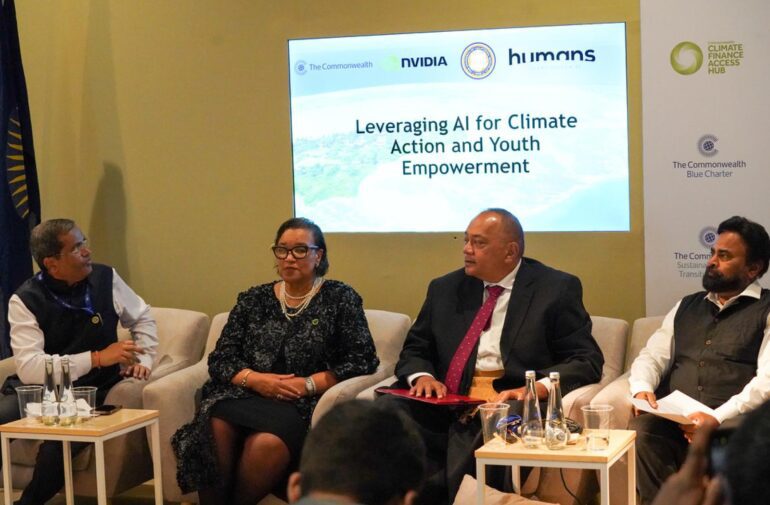TL;DR:
- The Commonwealth-NVIDIA partnership showcased at COP28 in Dubai aims to harness AI for climate action and youth empowerment.
- It involves collaboration between the Commonwealth Secretariat, NVIDIA, UC Berkeley, and Humans.ai under the Commonwealth Artificial Intelligence Consortium (CAIC).
- CAIC focuses on enhancing AI capabilities in small states, addressing climate change, and promoting economic growth.
- The event emphasized responsible AI use and its potential to tackle global challenges, particularly climate change.
- The digital divide between high and low-income countries was recognized as a challenge in AI adoption.
- AI applications like ‘Omniverse’ were demonstrated for monitoring sea-level rise in Tonga, aiding economic and infrastructure planning.
- UC Berkeley’s Smart Village Toolkit powered by AI offers opportunities for rural communities.
- Young people were highlighted as crucial in driving climate action through AI, requiring tools and skills for success.
Main AI News:
In the realm of international collaboration and technological advancement, the Commonwealth-NVIDIA partnership stands as a beacon of hope and progress. Their joint efforts have paved the way for an innovative approach to addressing two pressing global concerns: climate change and youth empowerment. This monumental initiative was showcased during a high-level panel convened by the Commonwealth Secretary-General, the Rt Hon Patricia Scotland KC, on the sidelines of the United Nations Conference on Climate Change COP28 in Dubai.
Diverse stakeholders, including representatives from Commonwealth member countries, international organizations, women and youth groups, tech giants, start-ups, and non-governmental organizations, gathered to witness the unveiling of a collaborative endeavor that promises to reshape the landscape of climate action and youth engagement. This groundbreaking partnership brings together the Commonwealth Secretariat, NVIDIA, UC Berkeley, and Humans.ai under the banner of the Commonwealth Artificial Intelligence Consortium (CAIC), which was inaugurated in April 2023.
At its core, the CAIC aspires to bolster the domestic AI capabilities of smaller nations, enabling them to harness the latest global innovations, from cloud computing to generative AI. This initiative seeks to fortify local infrastructure and supply chains, mitigate the impact of climate change, elevate workforce skills, and propel economic growth in these regions. The partnership’s forward-looking vision has been met with widespread acclaim, recognizing the vital connection between youth involvement and climate action facilitated by AI technology.
The event’s inauguration at the Commonwealth Pavilion featured a keynote address from the Commonwealth Secretary-General, who emphasized the responsible and ethical use of AI as a transformative tool for tackling global challenges. With COP28 unfolding, the urgency of addressing climate change was underscored, with AI emerging as a powerful ally in monitoring, modeling, and mitigating its effects, all while advancing the Sustainable Development Goals (SDGs) and fostering economic growth.
Prime Minister Siaosi Hu’akavameiliku of Tonga echoed the sentiments of astuteness and strategy required to navigate the AI landscape, particularly in bridging the digital divide between high and low-income member countries. The necessity of cooperation to close data and skills gaps was emphasized as an integral part of the roadmap ahead.
To exemplify AI’s pivotal role in climate action, NVIDIA and Remote Sensing and Satellite Hydrology (RSS-Hydro) presented the practical application of AI through tools like ‘Omniverse,’ which monitors and visualizes the sea level rise in Tonga. Such information is invaluable for economic and infrastructure planning in small states, highlighting the tangible benefits of AI-driven solutions.
UC Berkeley’s Smart Village Toolkit, powered by AI and developed in partnership with Humans.ai, showcased how artificial intelligence can uplift the livelihoods of rural communities, providing opportunities for the 3.4 billion citizens living in such areas worldwide. Professor Solomon Darwin, the Executive Director of the Garwood Centre for Corporate Innovation and Head of the School of Business at UC Berkeley, emphasized the need for global awareness and collaboration to address the Earth’s deteriorating condition.
Throughout the event, speakers emphasized the imperative of leveraging AI to empower youth in small states like Tonga, equipping them with the knowledge and tools to foster a sustainable and climate-resilient future. Unnikrishnan Nair, Head of Climate Change at the Commonwealth Secretariat, stressed AI’s transformative potential within the Commonwealth Living Lands Charter, emphasizing its role in sustainable land and biodiversity management. Sabin Dima, CEO and Founder of Humans.ai, underscored the importance of giving vulnerable groups a voice through innovative, real-time solutions.
Aman Vernekar, a youth representative and President of the Cambridge Climate Society, highlighted the need to provide young people with the necessary tools to drive climate action, especially in AI, where local context and data play a pivotal role. Participants unanimously agreed on the significance of continued collaboration with young leaders in the ongoing journey towards a more sustainable and climate-resilient future, propelled by the transformative power of AI. This partnership heralds a new era of innovation and cooperation, where technology serves as a catalyst for positive global change.
Conclusion:
The Commonwealth-NVIDIA partnership signifies a strategic move towards leveraging AI for sustainable development and climate resilience. By addressing the digital divide and empowering youth, this initiative opens up opportunities for innovation, economic growth, and a more sustainable future. It also highlights the growing importance of AI in addressing global challenges, offering potential market opportunities for AI-driven solutions in climate action and youth empowerment.

